Teaching and Learning
Taming My Commute with The Great Courses
I am one of the unlucky members of the American workforce with a commute the requires extended driving on a freeway through a major metropolitan area. I live in the SW corner of the Portland metro area and have to crisscross the city to and from work in the NE corner of the city. I estimate that I spend about an hour and 70 minutes a day commuting. I’m aware many people have it much worse. Nevertheless, considering I’ve had the same commute for nearly 30 years, it gets a little old.
In the morning I am on the phone with my kiddo, so that stretch is covered. However, in the interest of enjoying the slightly longer trip home every day I have resubscribed to a service that I have enjoyed in the past: The Great Courses. The company started by selling individual courses on CD or VHS that one could purchase. Now, you can stream the lectures on your phone, or watch/listen to them on a computer or iPad. Their collections is vast and I am determined to get my money’s worth learning while I drive home every day. I, like others, don’t need another monthly subscription chipping away at my checking balance, but I think this one is going to be worth it. I’ll revisit down the road and share some of the classes I’ve enjoyed.
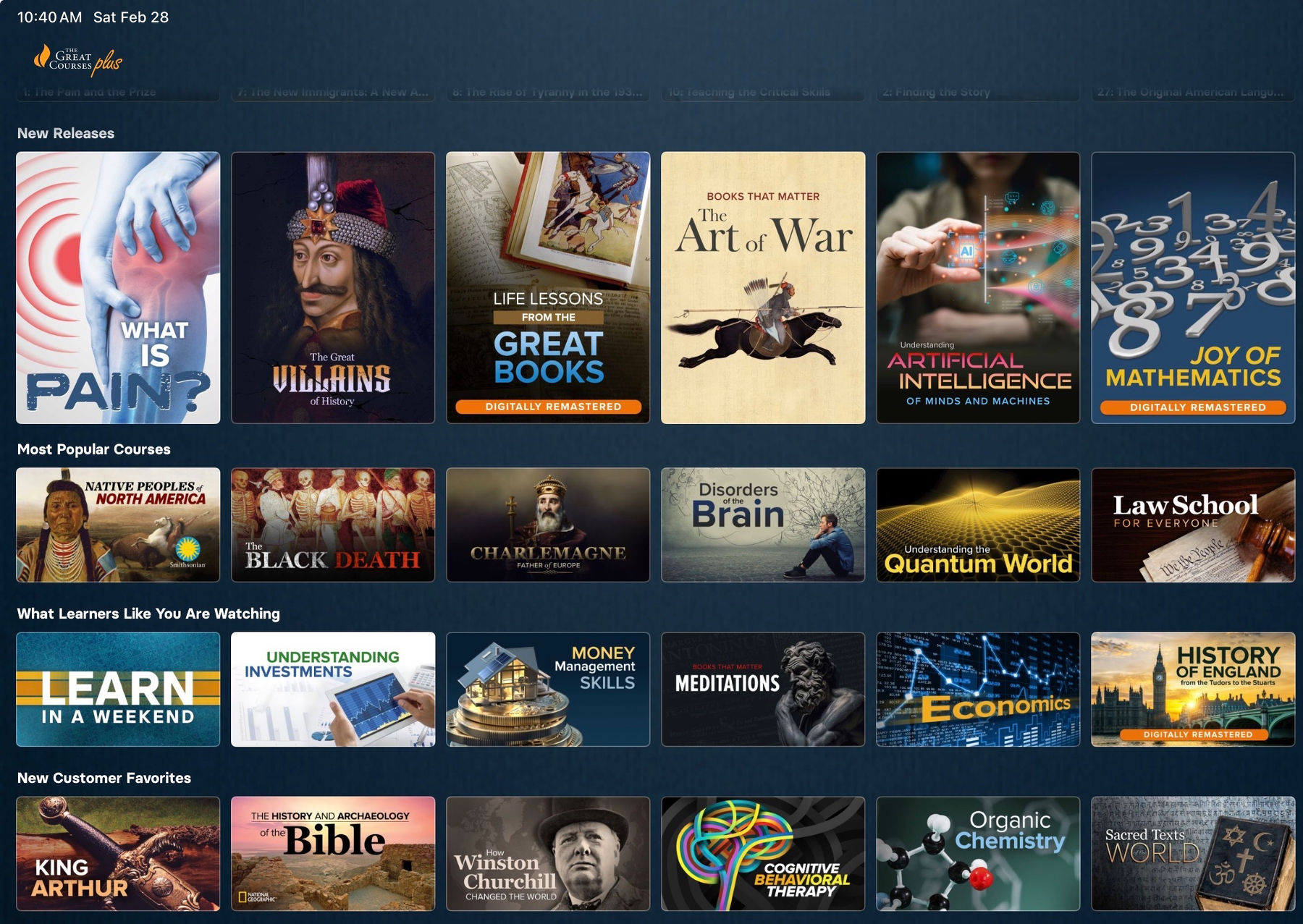
Three Ways I Am Using AI
I have been an avid adopted of AI, but at the elementary level of chatbots and Notebook LM. Claude Code is not something I’ve played around with yet very much. I thought I’d shard a few ways I have been using AI to either improve my teaching or help with an interest of mine.
-
Asking questions while reading: I really enjoy being able to get context, word definitions, and descriptions of people or events while I am in the middle of reading something. This helps me better understand what I am reading, but I’ve found it also allows me to follow tangents that the book I am reading isn’t necessarily going to satisfy. At this point, I have a Project in ChatGPT called ‘My Reading’ where I ask all my questions. The idea is that the AI will start to understand both what I am reading and what I am interested in and eventually make it’s responses more personal. That said, of late I have been using Gemini and Claude much more than ChatGPT, and I haven’t yet made the equivalent Gems or Projects in those apps.
-
Creating tailored short readings for my classes: I organize my teaching around a specfic framework that includes what called an ‘IN." This is the part of the lesson where I am introducing the topic to the students. Sometimes my INs textual context descriptions. AI is great for producing these because I have gotten good at proving precise prompts that explicitly describe grade level, topic, length, as well as weather or not I want certain key words bolded and then defined. I can also pinpoint the context since I already know where I am going with the lesson. See example below.
-
Diet and excercise evaluation: I have gotten into the habit over the past few years of keeping a Google Doc where I record a few details about my day, including my Oura ring score, when I start and stop my food consumption every day, what food and drink I consume, as well as my steps, mediation details, and exercise details. I have created a custom Gemini Gem that I have called my ‘Health Advisor.’ It knows my health goals and every morning I give my daily log and have it give me a score, along with notes and recommendations for the new day. I love it. Not only does is nudge me to make better choices, but I love that I get a daily score based on a specif rubric that I created (and can tweak anytime I like).
I have other use cases to share, but these are the most important for me at the moment.
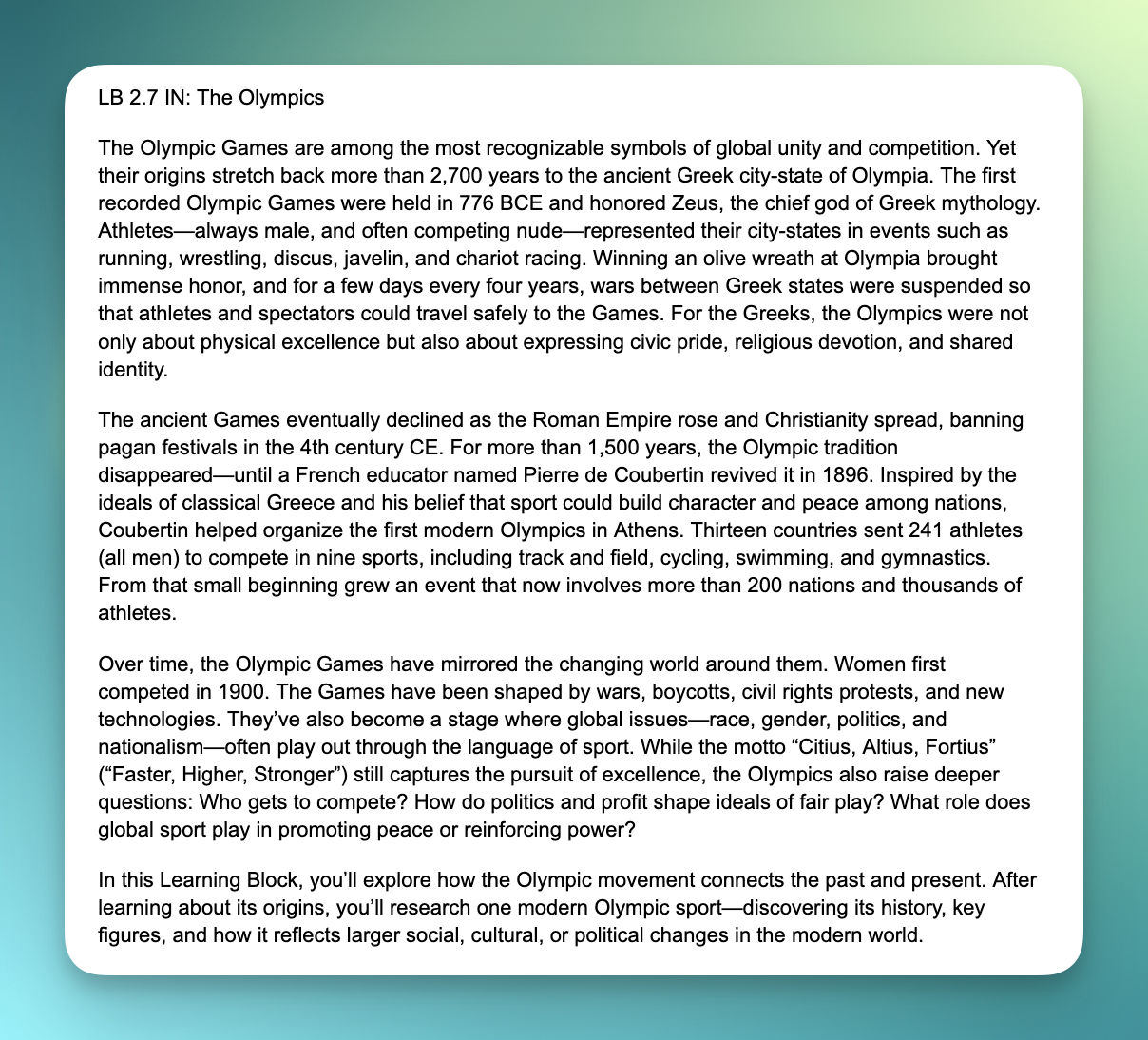
Thinking about Robert Reich and William T. Sherman
One of the books I am currently enjoying is economist Robert Reich’s memoir Coming Up Short. The book is not a straight memoir, as Reich works in polemics about American politics and our economy while telling his life story in roughly chronological order. I tend to agree with his views, so I am not put off by the political digressions. Reich was born to a working class Jewish family and eventually earned a law degree from Yale, where he knew and went to school with Hillary Rodham, Bill Clinton, and Clarence Thomas. He worked for the Carter administration in the 1970s and eventually served as President Clinton’s secretary of labor. He eventually became a professor (at Harvard and Berkeley) and is now a pretty outspoken policy wonk advocating for a variety of progressive issues.
I have also been thinking about Union General William Tecumseh Sherman because I recently taught a lesson about his ‘March to the Sea’ during the Civil War. The essential question of the lesson was whether or not it is justifiable to make war on civilians and infrastructure, which Sherman did to great effect. As I write this, I realize that I am overdue in reading one of the biographies about Sherman, because it is clear to me that he is a fascinating character. A fact that I love about him is the willingness he had to do what it took to defeat the traitors during the American Civil War. That said, he was generally conservative, a racist, and was motivated more by keeping the Union together than abolition.
What might these two very different people have in common? The connection that comes to mind has to do with systems. Sherman had his soldiers attack the railroads (leading to ‘Sherman’s Neckties’) and farms (leading to ‘Sherman’s Sentinels’) as they marched through the South. He also didn’t feed his soldiers and instead had them ‘forage,’ which led them to steal from the people of Georgia as they made their way to the coast from Atlanta (which was left in flames). By doing this, Sherman attacked the system that sustained the Confederacy.
I see Reich as someone who thinks a lot about the reality of the economic system we live in. Rather than wallowing in theory, in his book Reich often explains the mechanisms and decisions that many people in power make that impact our society, for better and for worse.
I’m left wondering, what can one do to improve the corrupt and immoral systems we are a part of? Simple, every day choices made by enough people hopefully preclude the need for the type of choices Sherman had to make.
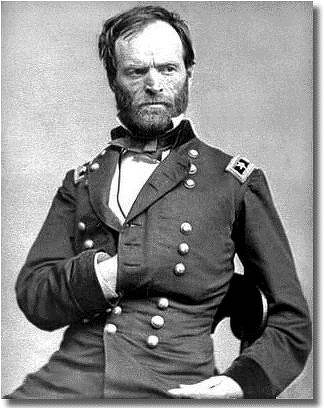
A Typical Day in AP Governmet
The teaching agenda below is from a week and a half ago in my AP Government class. We were early into Unit 3 (Civil Rights and Civil Liberties), which you can detect by the Learning Block (LB) number 3.2. This indicates we are in the second LB of the unit. This particular LB was about freedom of religion, specifically the ‘establishment clause’ and ‘free excercise clause’ of the First Amendment.
AP Gov has a collection of required Supreme Court cases that students need to be familiar with so this learning block was where I was able to introduce Engle v. Vitale and Wisconsin v. Yoder. This agenda ended up being too ambitious and we only got through the first case that day.
To teach the case, I have a published case study that breaks the case down into four parts: Background, Constitutional Issue, Majority Opinion, and Dissenting Opinion. We read it together than I always pair the reading with a short informational video (AP Gov required cases all have several video options available for review on YouTube). After that students work in pairs to answer a set of questions about the case.
The following class, students finished up the LB by looking at the Yoder case then doing some writing in their INBs (Interactive Notebooks) that forces them to synthesize their understanding of both cases.
It is worth noting that I usually start Fridays in all my classes with the one-two punch of a quiz and a self assessment. However, this week was a short week (due to the end of the winter break) so I scratched those two initial activities.
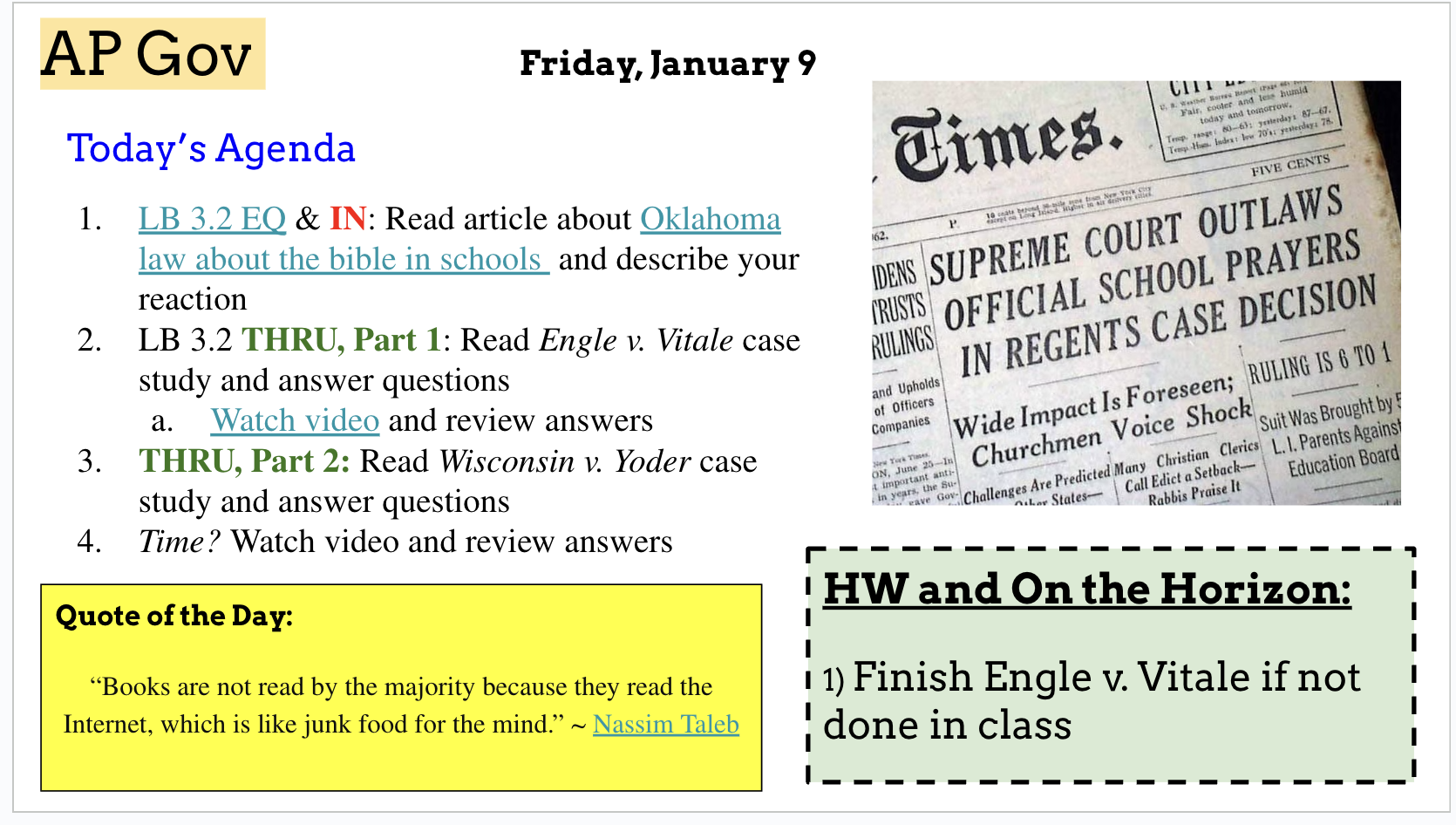
A Typical Day in AP US History
Today and tomorrow, I thought I’d share a couple of typical class agendas. The first is from last Thursday in my AP US History class. This was the final class period before the students took a unit exam. We started by finishing a Digital Inquiry Group lesson about notorious abolitionist John Brown. The plan was to have them answer the Essential Question for the Learning Block (LB), which was ‘Was John Brown a hero or a misguided fanatic?" However, in order to make sure we got through the last Learning Block of the unit, I had them chat about the EQ with a deskmate and then we reviewed together quickly and moved on. The next LB was about the election of 1860. For their IN (my version of the intro to the assignment), I passed out a short, empty chart about the elections of 1800 and 1824. I asked them to work with a partner to identify the winners of each of those elections and anything unusual about them. They chatted, then the whole class reviewed. After that I lectured briefly (about 12 minutes) about the 1860 election (using Google slides that I projected onto the whiteboard in the front of the room). Student were expected to take notes during the short lecture. After that, we had just enough time for students to process their learning by completing an SAQ (Short Answer Question) that I created as their OUT (which is my version of the wrap-up of a LB).
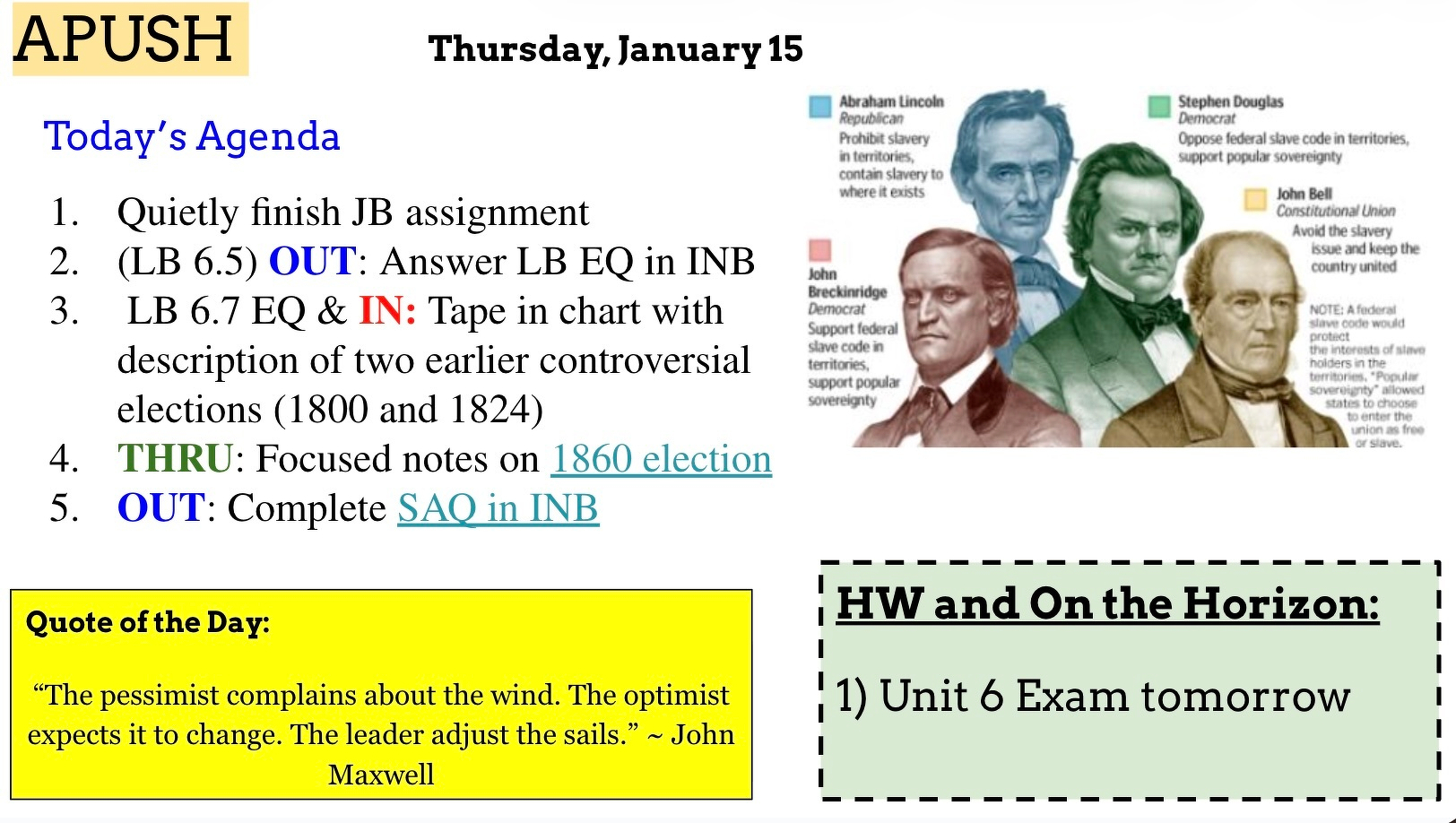
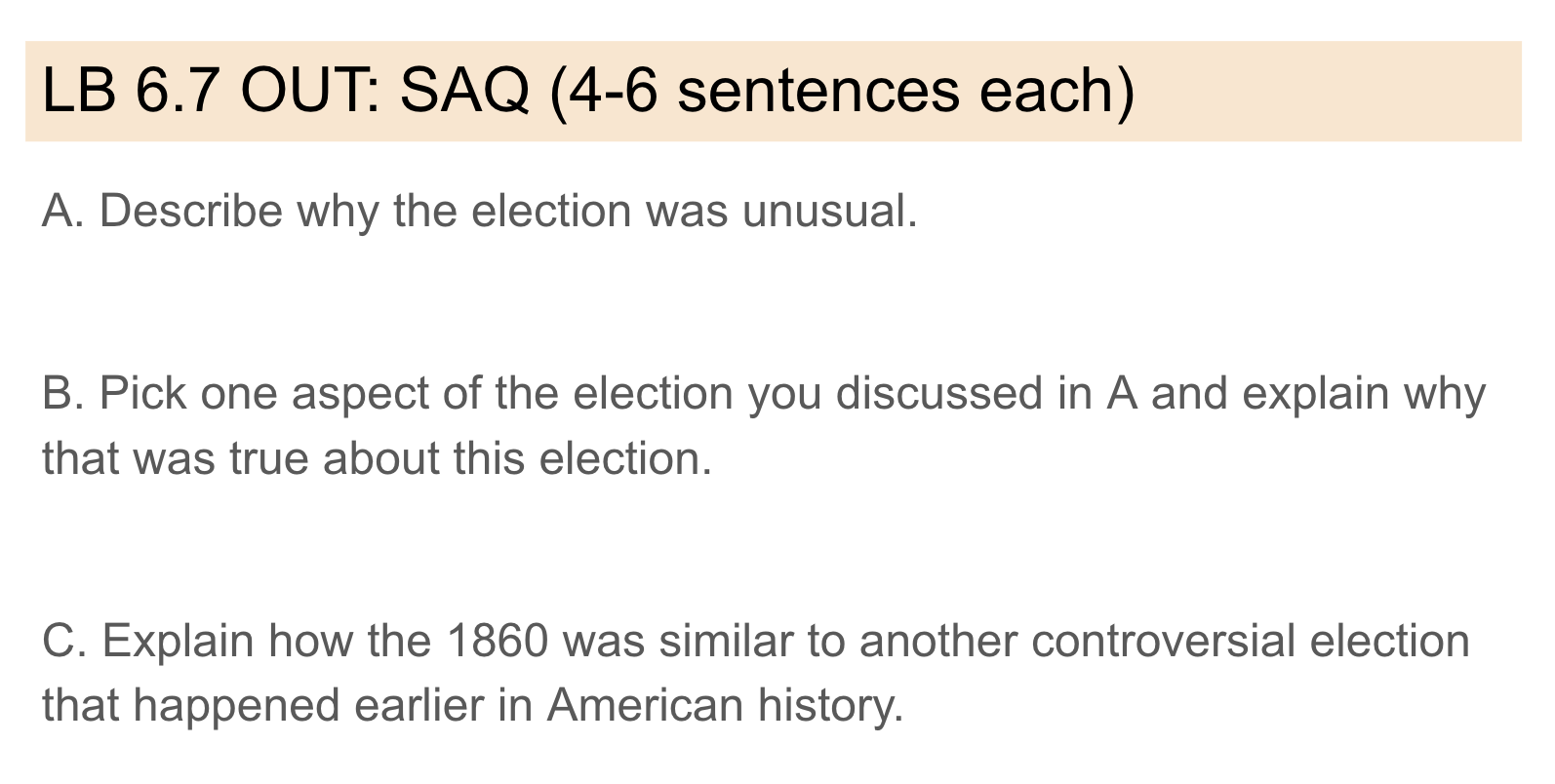
The Kids Are Alright
My school has a hybrid schedule. Two days a week the periods are 90 minutes long. I usually take that opportunity to start those longer classes with what I call a ‘whip around’ question. These questions are meant to let everyone share their thoughts and for me to get to know my students better. This week I asked my students ‘What is something that you are really into right now?’ I got a wide assortment of answers (from new TV shows, to baking, to taking walks at night), including references to music. To my delight, in my 7th period class four students mentioned listening to the Grateful Dead. This was an amazing surprise, though it makes sense in the wake of Bobby Weir’s recent passing. It goes without saying that I was stoked to be able to talk about my love of the Dead for a few minutes. Students even asked if I’d shared some Dead tunes in Google Classroom. (Mission accepted!)
Another thing that recently happened at my school happened today. One of my former students, who is now a senior, organized a walkout and short march from our school to the district office. The whole thing lasted about an hour, but about 400 students participated. Needless to say, it is encouraging to see young people engage politically within the growing authoritarian environment we are all experiencing in the United States.
A Connection with the Past
I am teaching my students about the coming of the American Civil War. Today we read about and discussed the Compromise of 1850 and the attendant Fugitive Slave Law. Considering we are two days out from the murder of Renee Nicole Good and a day out from federal agents having shot two people here in Portland, students made some connections. Of course, some of my students are currently quite frightened by what is happening in our country. Others are seething. I noticed that it was quite easy for them to understand the anger and outrage northern abolitionists must have felt in the 1850s, when their federal government was behaving in such a patently immoral way. Unlike any other year that I have taught this, students are connecting in a unique and powerful way.
You might say events, along with an understanding of the past, are waking them up.
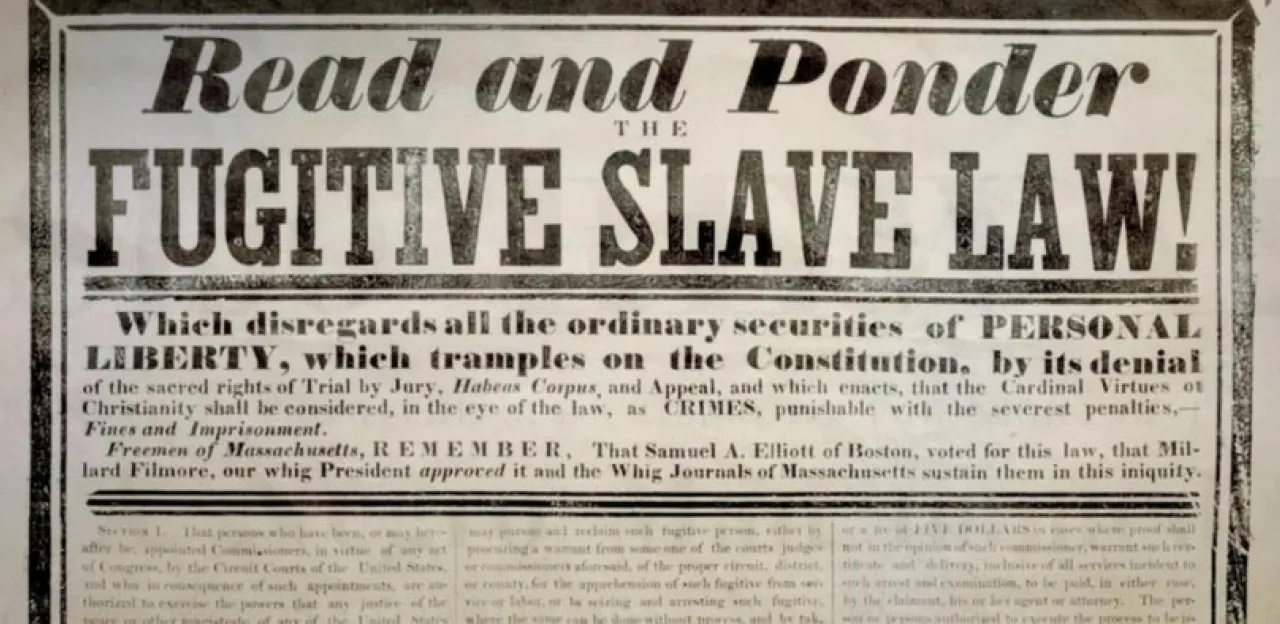
Exciting News for My School
I found out today that our school is going to be visted by Ketanji Brown Jackson, one our country’s nine Supreme Court Justices. As an AP Government teacher this is thrilling. We just finished learning about the judicial branch last week and all my students know who she is. I’ve had (now retired) congressmen Earl Blumenauer visit my class before, and early in his presidency George W. Bush gave a speech in our gym (I was conveniently out of town for that). The Justice will be visiting in March as part of a book tour to promote her recent memoir Lovely One.
Ketanji Brown Jackson was appointed by President Biden in 2022 and is the newest Justice of the Supreme Court. She’s a fellow Gen Xer who grew up in Miami, Florida and was raised by two teachers. She earned her Bachelor’s and her Master’s degrees from Harvard and served as a supervising editor of the Harvard Law Review. She replaced Justice Stephen Breyer whom she had clerked for previously. She is also the first SCOTUS justice to have been a public defender. She is also the first African American woman to serve on the Supreme Court.
Since being on the court, she has stood out for being willing to ask a lot of questions during oral arguments. By contrast, longest serving Justice Clarence Thomas went 10 years without asking a single question from the bench (from February 2006 to February 2016). Justice Brown Jackson has also written 8 solo dissents thus far, an unusually high number. Finally, students of the Supreme Court have described her as pushing ‘progressive originalism.’ Conservatives tend to stake a claim to ‘originalism,’ which is a reading of the law that harkens back to the supposed ‘original’ intent of the founders. In Justice Brown Jackson’s case, she has harkened back to America’s ‘second founding’—the Reconstruction Era–and especially the 14th Amendment to argue in favor of ideas such as affirmative action.
Needless to say, I’m stoked to see her speak in person in the spring.
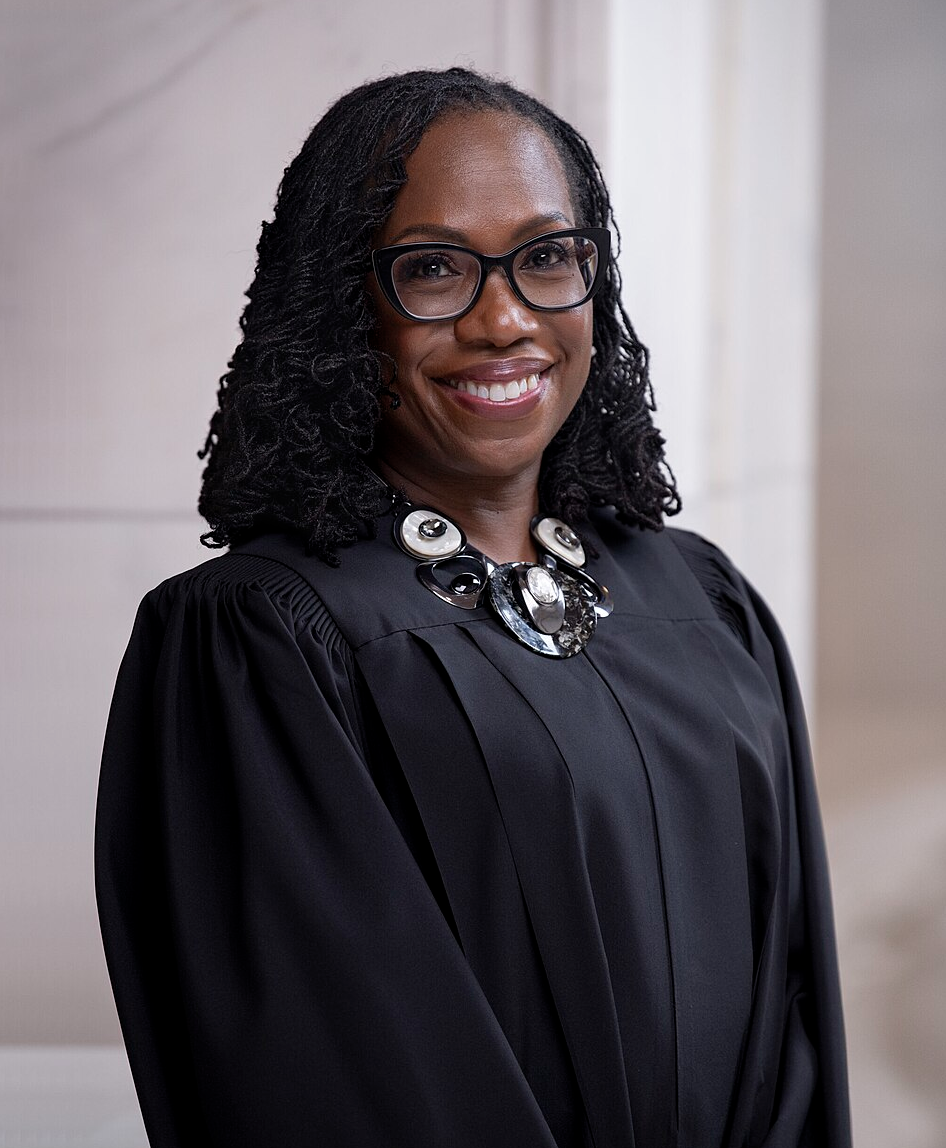
On William Penn
Most of us remember that Pennsylvania was founded and named after William Penn. Many will also recall that Penn was a Quaker and that the Quakers were a Protestant Christian sect that were pacifist and later played an important role in the abolitionist movement and the underground railroad. Oregonians may know that one of our local universities is named after the leading Quaker George Fox.
Penn comes up in my AP US History class when students are learning about the unique attributes of the original British colonies in America. I always talk a little about the Quakers and note that the city of Philadelphia derives its name from the Greek words for ‘dear’ or ‘loving’ and ‘brother.’ Hence, the ‘City of Brotherly Love.’ Very Penn.
I also instruct my students that Penn was relatively warm to the indigenous tribes. His general kindness backfired however, in the sense that migrants to the colonies found Pennsylvania relatively welcoming since the founder was so tolerant. The result was, after Penn’s death, the arrival of many who were not so tolerant, ultimately dooming the Native peoples to similarly frustrating sorry relative to the other parts of British North America.
However, I recently learned through my reading that Penn actually took the time to learn the language of the Lenni-Lenape (Delaware) people in order that he would be able to more fairly deal with them (he already knew five other languages, including English). Penn removed the middle man, hoping for deeper understanding and more fair dealing. I found this to be quite incredible, given what we know about the other colonists and their general greed and avarice. Indeed, Penn’s respect for the natives led to the so-called ‘long peace’ in Pennsylvania which lasted throughout his lifetime.
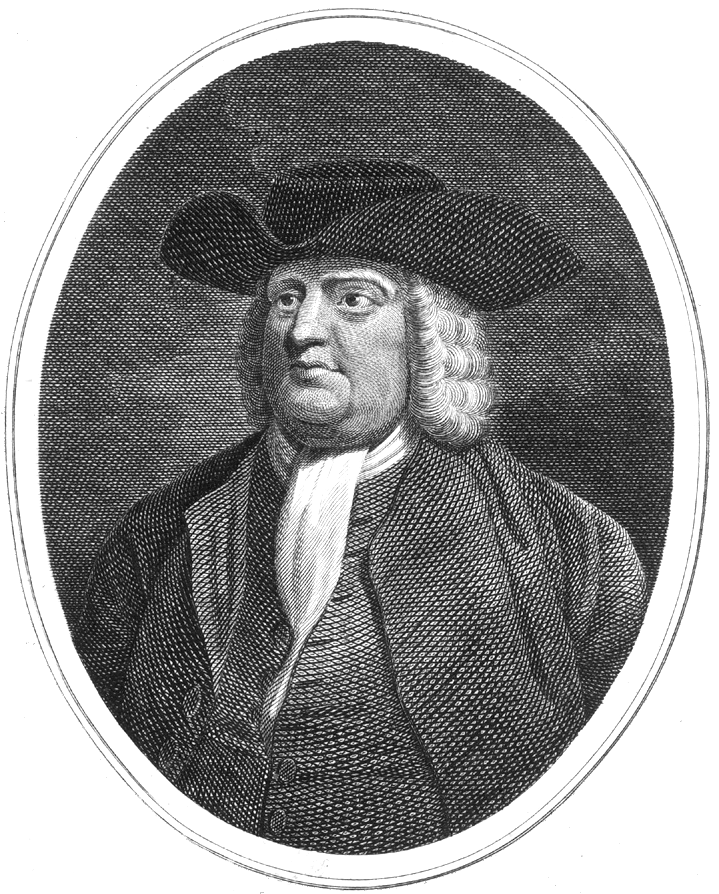
Using Notebook LM in Class
I have been experimenting as a teacher with Notebook LM. One of the cool things we can do is create our own ‘notebook’ with our own hand selected resources, and then share them with our students. Student can then use the ‘notebook’ to study. For instance, they can have the tool quiz them based on the content in the ‘notebook.’ They can also make a concept web and then click around to review details. Another cool feature, which has been out for a while now, is being able to make a podcast that reviews all the content in the ‘notebook’.
My APUSH students will be taking an exam soon on the period 1800 through 1848. I compiled a ‘notebook’ that included hand-selected YouTube videos, websites, and even my own lecture notes. It took the software about 2 minutes to make a 14 minute podcast conversation reviewing all the content in the ‘notebook.’ Pretty damn cool! The podcast is here if you want to check it out.
My same students are also having a seminar on an essay about Nat Turner’s rebellion in 1831. Because I have a pdf of the essay, I was able to turn that into a podcast, as well. My plan is to share that with the kids after their seminar, as I don’t want to discourage them from doing the reading.
A new feature that hasn’t quite rolled out to schools yet is infographics. All together, this is an amazing new tool for high school students, and for lifelong learners.

Nano Banana Pro Revisited
Yesterday I wrote about my disappointment with the latest version of Google’s image generator, Nano Banana Pro. I decided to ask Gemini what I was missing and lo and behold, it explained to me what I was doing wrong. I also realized that the best way to make infographics, which I’ll want to do for my students, is to use Notebook LM, not Nano Banana.
Here are a couple of pics I created for my next lessons in AP Gov and APUSH. We are looking at the New Deal and Great Society in AP Gov and Nat Turner’s Rebellion in APUSH.
Pretty cool.


Playing Around with Nano Banana Pro
I am interested in the latest tech and decided today to play around with Google’s new Nano Banana Pro, which is the top of the shelf (for now) AI image generator. Since it landed a few days ago, there are a lot of YouTubers showing off the potential use cases.
The first image I worked on was a simple, but custom infographic comparing the New Deal and the Great Society for my AP Gov class. Students are working in pairs to conduct the initial reasearch, but I wanted a visual for our review. I’m pleased with the results, but not blown away.
I then decided to see if I could get a picture of FDR and LBJ in the front of my classroom so I could include it on our next daily agenda. I uploaded a photo of the front of my room. Unfortunately, it couldn’t handle my request. For one, it couldn’t use the photo I uploaded. Instead the image it created used a made up, generic classroom. Secondly, it wouldn’t make images of FDR or LBJ since they are ‘public figures.’ Disappointing, but understandable.
Finally, I asked Nano Banana Pro to make a timeline infographic of 10 major uprisings in American History (we are about to have a Socratic seminar on an essay about Nat Turner). It did an alright job, but included two of the events twice. I asked it again to remake the infographic without the duplications and it duplicated _all _the events. Very disappointing. It makes me wonder how much the YouTube influencers are getting paid by Google to promote a product that isn’t quite as good as advertised. Even if they aren’t paying them, surely they are boosting the algorithm (since they own both YouTube and Nano Banana). Needless to say, I don’t imagine using this tool much in the near future.


On Grade Inflation
I came across the information below in today’s Morning Brew newsletter. It appears professors at one of America’s most elite universities are inflating grades. Shocker! Indeed, I don’t buy the comment from the student quoted at the bottom of the screenshot. College should be much more difficult than high school and just because a student earned A’s in high school, that shouldn’t necessarily mean they will deserve the same grades in college.
In fact, as a high school teacher, approaching three full decades in the classroom, I can say emphatically that high schools are also inflating grades. In the case of high schools the reasons for this include the incentive placed on schools to increase graduation rates and ‘equity.’ Neither of these root causes are positive developments, yet they are the current reality, at least where I teach.
Whether or not this all matters is worth thinking about. Here are a few takes on the topic: Take #1 and Take #2. The problem I have with it is that it warps the connection in the minds of students between their efforts and the quality of the outcomes of their efforts. In all of life, feedback is data. If the feedback is inaccurate, it puts people at a disadvantage as they move through early adulthood. The disconnect can lead to some serious pain (like borrowing tens of thousands of dollars for school and then flunking out). For kids coming from middle and working class families, they deserve honest feedback in the form of grades.
Privilege is a flip side to this. Many people whose lives and outcomes are boosted by privilege face the same problem of disconnect between effort and outcomes. Often their success had little to do with their efforts and a lot to do with the privilege they inherited. Considering that approximately 57% of Harvard students come from families in the top 10% of the income distribution, it is clear this is relevant give the grade inflation there.
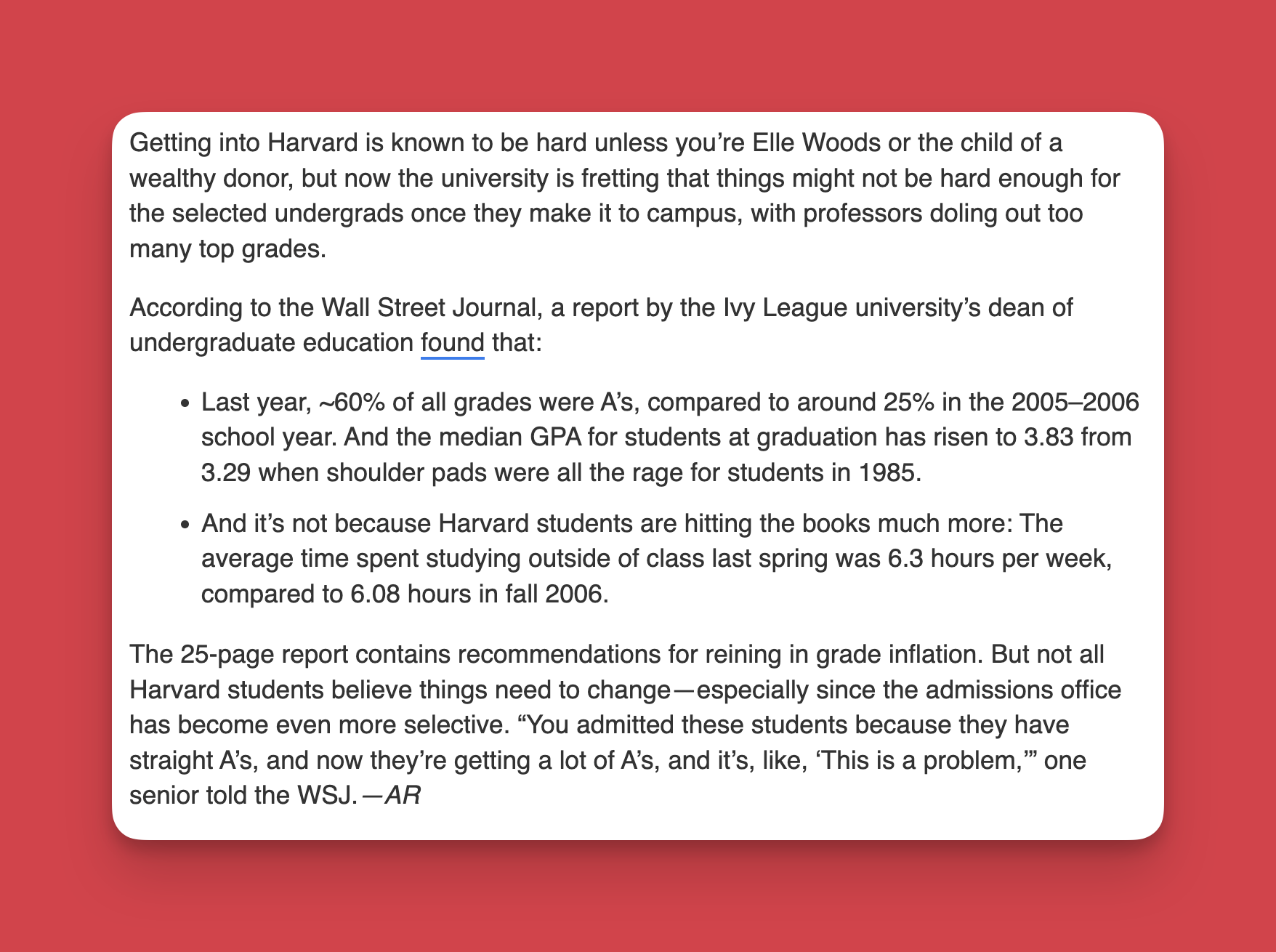
Patriotism trumps Nationalism
In my APUSH classes today we wrapped up the War of 1812 and began a lesson on the surge of nationalism that arose in the young United States in the wake of the war. To help differentiate nationalism from patriotism, I shared the quotes below from Roger Cohen’s excellent, thought-provoking book An Affirming Flame and encouraged students to discuss them.
My students got Cohen’s points immediately, and I think it is safe to say they agree with Albert Einstein that nationalism is an ‘infantile disease’ that leads to war and is primitive and unbecoming of grown ups in this day and age. Many of us can see that now. However, nations as political constructs are not all that old and despite the fact that in the early 1800s the Napoleonic Wars were raging in Europe, the horrors of the two world wars lay ahead of everyone. The nationalism that arose in America during and after the Era of Good Feelings had many contributing factors (such as the Battle of New Orleans, Clay’s American System, Chief Justice John Marshall’s SCOTUS rulings, and developments in the arts) and in hindsight it is understandable why it arose. However, surely it is time to put the ridiculous ideology to bed and replace it with an openhearted patriotism and general goodwill towards others.
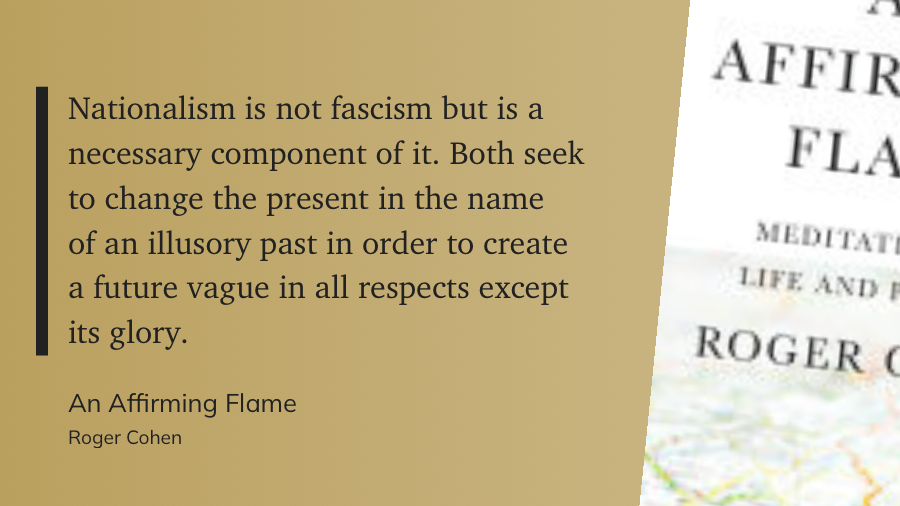
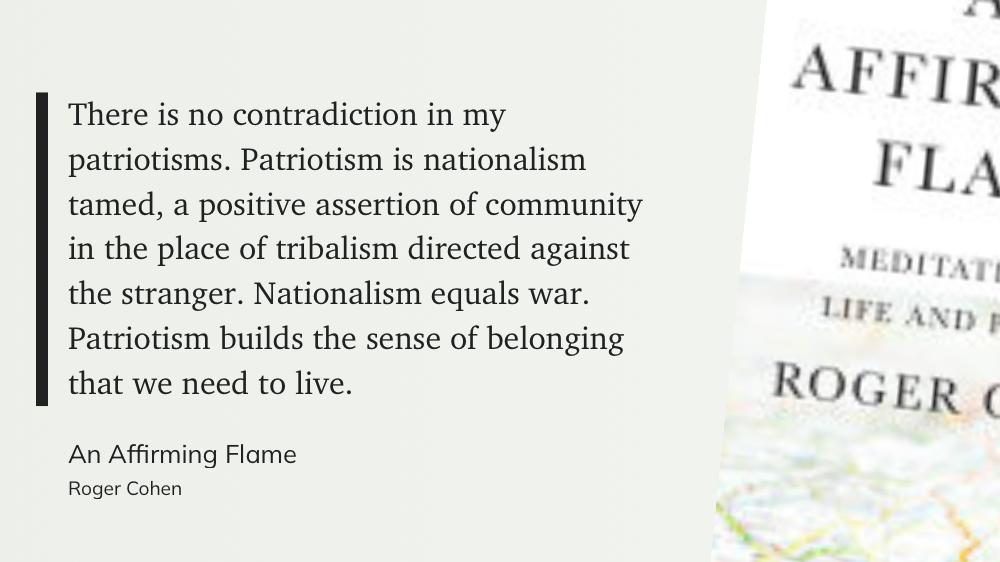
Demographics of a Dysfunctional Legislative Branch
We are looking at Congress as an institution in my AP Government class at the moment. In order to allow students to see the demographics of Congress relative to our society, I provide the official report that Congress makes available and ask student to do a bit of research. Below is a demographic summary of Congress, in all its dysfunction. Note, this does not include the recently elected Democratic congresswoman from Arizona Adelita Grijalva.
- Party breakdown (May 13, 2025): • House: 220 Republicans (plus 3 Delegates), 213 Democrats (plus 2 Delegates and the Resident Commissioner from Puerto Rico), and 2 vacant seats. • Senate: 53 Republicans, 45 Democrats, and 2 Independents (both caucus with Democrats).
⸻
- Women in Congress: • 155 women serve (129 in the House, including 4 Delegates; 26 in the Senate). • They make up 28.65% of total membership. • Women make up about 50.5% of the overall U.S. population, so they remain underrepresented.
⸻
- Average age: • House: 57.9 years • Senate: 63.9 years • Median U.S. age: about 39 years (U.S. Census 2024). → Members of Congress are much older on average than the general population.
⸻
- Most common professions: • Law, business, and public service/politics. → In contrast, the most common U.S. jobs overall are in retail, food service, and office administration—showing Congress is dominated by professionals rather than service-sector workers.
⸻
- Education: • 96% of Members are college graduates; 66% of House and 78% of Senate members hold advanced degrees. • By comparison, only about 38% of U.S. adults have a bachelor’s degree or higher—so Congress is far more highly educated than the general population.
⸻
- Average length of service: • Representatives: 8.6 years (about 4.3 terms) • Senators: 11.2 years (about 1.9 terms) → A more experienced Congress can mean institutional knowledge and policy expertise, but can also reduce turnover and fresh perspectives. Conversely, many newcomers can bring new ideas but may lack legislative experience.
⸻
- Religious affiliations: • 55.1% Protestant, 28.0% Catholic, 6.0% Jewish, 1.7% Latter-day Saints, small numbers of Muslim, Hindu, Buddhist, and Orthodox members. • Compared to the U.S. population, which is about 63% Christian and more religiously diverse overall, Congress remains more heavily Christian.
⸻
- African American Members: • 61 in the House (including 2 Delegates), 5 in the Senate → 66 total (12.2%). • African Americans make up about 13.6% of the U.S. population, so representation is roughly proportional.
⸻
- Hispanic or Latino Members: • 50 in the House (including 1 Delegate and the Resident Commissioner), 6 in the Senate → 56 total (10.35%). • Hispanics/Latinos make up about 19% of the U.S. population, so they remain underrepresented.
⸻
- Asian American and Pacific Islander Members: • 24 total (21 in the House, 3 in the Senate) → 4.4% of Congress. • Asian Americans and Pacific Islanders are about 7.5% of the U.S. population, so they are underrepresented.
⸻
- Native American Members: • 4 total (3 in the House, 1 in the Senate) → 0.74% of Congress. • Native Americans are about 1.3% of the U.S. population, so they are underrepresented.
⸻
- Military service: • 98 Members (18.1%) have served or are serving in the military. • This is down sharply from 64% in the 97th Congress (1981–82) and 73% in the 92nd (1971–72). • About 6% of U.S. adults are veterans today—so Congress still has a higher veteran rate than the general population but much lower than mid-20th-century levels.
5 Recommendations
This is a beautiful translation of the Buddha’s timeless wisdom. The introduction is sublime.
- Getting Yelled at By Dumbasses blog post on How Things Work Substack
Came across this blog post recently and agreed wholeheartedly. Thought the message should be shared.
- Goose - State Of The Art (A.E.I.O.U) [feat. Jim James] - 9/24/25
Goose does a lot of great covers. They’ve been coving this song by My Morning Jacket for a while. Indeed, I saw them do it at my first show. Thing is, I didn’t really dig Goose’s version. This recent version has MMJ lead singer Jim James doing the singing. Much better!
- Documentary about the Dead in the fall of ’73, The Two Towers
This is probably for hardcore Deadheads only. A raw, honest look at the band in the fall of 1973. Primary source Grateful Dead historiography!
This is a cool AI tool. I use it personally but am increasingly using it for teaching, as it is now embedded in Google Classroom. If you are a high school teacher, you need to check this out.
Judging the Past
In three of my classes today we had a Socratic seminar on an essay by historian Douglas Wilson about Thomas Jefferson called Thomas Jefferson and the Meaning of Liberty. The essay is almost 30 years old and is a bit out of date with regards to Jefferson’s relationship with Sally Hemmings. Nevertheless, Wilson makes some interesting points about how modern Americans should think about viewing figures such as Jefferson, whose lives contained such glaring contradictions.
One of the specific points Wilson makes has to do with the idea of presentism, which he describes as judging those in the past through the lens of our modern societal norms and values. It is always an interesting idea to hear teenagers discuss. Often in years past students were quick to dismiss the logic of avoiding presentism. With ‘cancel culture’ on the rise, students often self-righteously condemned imperfect historic figures such as Jefferson and James Madison. Indeed, learning of Dr. King’s infidelity was often a hard blow for many of my former students.
However, in today’s discussions I noticed students were generally more wary about judging too harshly. It wasn’t that they couldn’t and didn’t call Jefferson out. They did. However, I was impressed to see that those students who spoke often articulated a nuanced take that both recognized Jefferson’s obvious moral hypocrisy, as well as the fact that historical figures are and were regular people and always far from perfect. It struck me because such nuance was often missing from discussions of this essay in the past. Indeed, students today recognized that social media has made it easier for people to judge others, both their contemporaries and historical figures. They noted that this was not a positive development.
At the end of the day, I felt good about the conversations we had for a lot of reasons. I especially appreciated the more sophisticated reading of Wilson’s argument about presentism. Indeed, a lack of nuance is present in the debates of the adults in our society nowadays, so I was happy to see young people going there. It will help in the coming days and months as they eventually take a look at Kermit Roosevelt’s take on the Declaration, American Revolution, and Reconstruction amendments.
Red Stockings and Trolley Dodgers
I am teaching a new elective class this year called American Sports History. One of the many benefits of teaching a new class is that I get to learn a lot. The early history of baseball was one of our early topics and while teaching I came across the origins of some team names that I had always wondered about. This was great because I am a huge sports fan. It was also cool because I often bring up team names while teaching history since so many names are derived from historical connections with their cities and regions. Obvious examples include; the New England Patriots, the Philadelphia 76ers, the San Francisco 49ers, and the Portland Trailblazers. When I point these out in class I get the pleasure of seeing many lightbulbs go off.
The origin stories I recently learned about have to do with the Cincinnati Reds and the Los Angeles Dodgers. I always wondered why a midwestern team would have a name associated as a political slur. Their original name was the Red Stockings, and they are considered to be America’s first professional team. They became the Reds eventually, but during the early days of the Cold War, they did actually change their name from the Reds to the Redlegs. They changed back to Reds in 1959.
Most baseball fans know that the LA Dodgers started in New York and were known as the Brooklyn Dodgers. But dodgers of what? Seems like a random team name. Apparently, before they were the Dodgers, they were the Greys, the Bridegrooms, and the Robins. In the 1930s, with trolley’s becoming ubiquitous, they were renamed the Trolley Dodgers. They eventually moved to the West Coast, and the local connection of the name became shrouded to most.
For the record, the original names (and locations) of my favorite teams are:
Athletics: Philadelphia Athletics (1901-1954) → Kansas City Athletics (1955-1967) → Oakland Athletics (1968-2024) → (Sacramento) Athletics (2025-2027, temporary while new stadium built) → Las Vegas Athletics (2028-present, planned)
Raiders: Oakland Raiders (1960-1981) → Los Angeles Raiders (1982-1994) → Oakland Raiders (1995-2019) → Las Vegas Raiders (2020-present)
Kings: Rochester Royals (1945-1957) → Cincinnati Royals (1957-1972) → Kansas City-Omaha Kings (1972-1975) → Kansas City Kings (1975-1985) → Sacramento Kings (1985-present)
Stanford Cardinal: Stanford University, Stanford, California (1891-present) - The team name changed from “Indians” (1930-1972) to “Cardinal” (1972-present), referring to the color cardinal red, not the bird.

They Can't Scroll Us Away
One of the hardest parts of teaching is covering topics that don’t naturally interest most 16- and 17-year olds. Some folks, mostly those that aren’t actually trying to educate young people, claim that the job of teachers is to make topics ‘interesting.’ This sort of cant grates. The fact is, sometimes young people need to be made aware of realities that—on a Tuesday afternoon in October—they won’t easily engage with. This has always been a dilemma for teachers (portrayed humorously by SNL back in 1992), but it is made even more problematic in the Age of Handheld Distraction. Teens today are used to watching a short video on their smartphones and scrolling past it within seconds if it doesn’t capture their interest. And teachers are not entertainers. Students can’t scroll us away.
The quote below by educator Peps Mccrea resonated with me because it’s true and because it isn’t something teachers hear all that often. If math was intrinsically interesting to 8 year olds, schools wouldn’t be needed. Indeed, algebra is not always a ‘magnet of attention’ for most people, kids or otherwise.
In my case, I recently taught Brutus No. 1, the most famous of the Anti-Federalist arguments against the ratification of the Constitution. It was written in 1788. It comes off as stilted to the modern reader. It is—Hard. To. Read. Of course, the arguments Brutus made about an overpowerful federal government ruled by a strongman is super relevant to teenagers growing up in Portland, Oregon at the moment. That depressing fact of life today helps make the reading relevant. But the point remains: it is not necessarily interesting (as evidenced by the fact that the vast, vast majority of Americans have no idea a) what Brutus’ arguments were and b) who the Anti-federalists were). Indeed, those who do know it most likely learned it in school.
So, the dilemma remains. We have to teach topics that aren’t always going to interest students, that aren’t natural ‘magnets of attention.’ The art of teaching–the perpetual challenge–is figuring out how to make even the dullest topics come alive for as many students as possible.
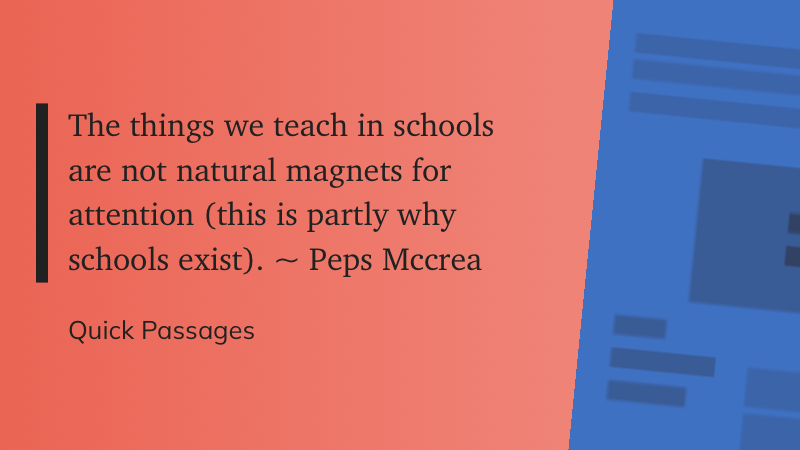
What My Students are Grateful For
Every Friday, after their weekly quiz, I have my students complete a Google Form that I call a ‘Self Assessment.’ I ask them how their week went and various related questions. I also ask them early on to tell me something they are grateful for. I am a big believer in noticing what we are grateful for because I believe it helps train the brain to become a seeker of such things.
The top five categories were: 1) Family 2) Friends (a close second) 3) Pets (more family!) 4) Music (🤘🏻) and 5) Food (a bit surprising, but hey, it makes sense).
This week God got a few shoutouts, but less than school related elements (such as quiz retakes and ‘enjoyable classes’).
Some memorable answers:
“I’m grateful to be alive, because I know being alive is even something so rare, that I should appreciate it every day.”
“The ability to listen to any recorded song from any point in history with just my phone for the price of 1 subscription.”
“Stevie Wonder”
“EVERYTHING!!! My life, family, air, every single thing.”
Pretty cool.